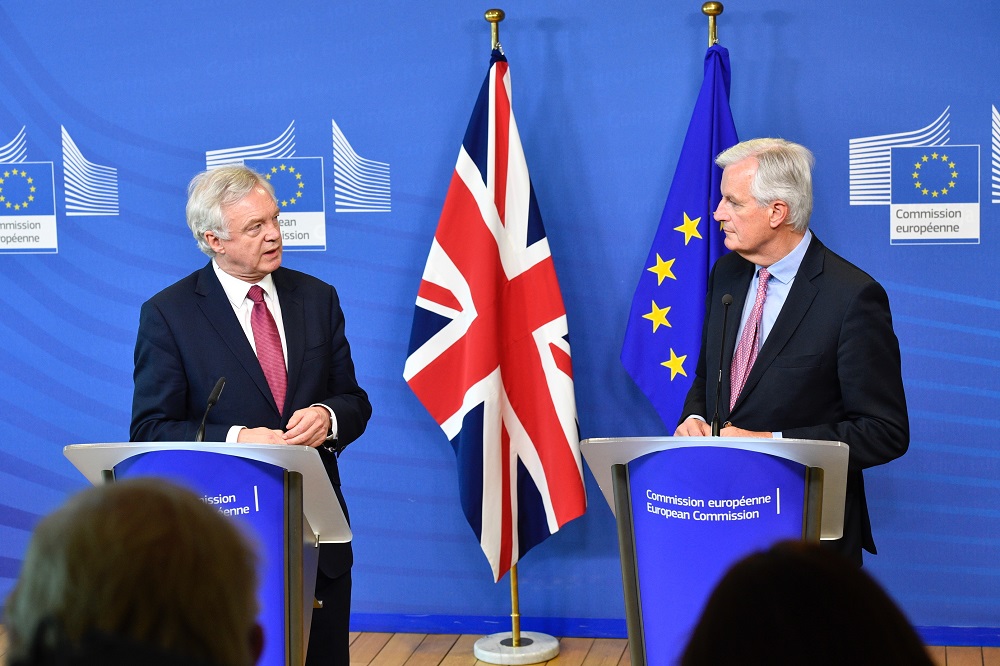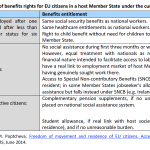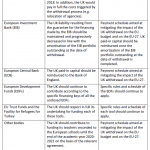Written by Alessandro D’Alfonso, Eva-Maria Poptcheva, James McEldowney and Laura Tilindyte,

Negotiations on the arrangements for the United Kingdom’s withdrawal from the European Union started on 19 June 2017. The European Commission is negotiating on behalf of the EU, on the basis of the European Council’s guidelines and the subsequent mandate from the Council. The European Parliament, for its part, has also laid down key principles and conditions for its approval of a possible UK withdrawal agreement. Three key priorities are set to dominate the first phase of the negotiations (with the future relationship between the EU and the UK left to a second phase). These are: citizens’ rights, settlement of the UK’s financial obligations, and ensuring the Northern Ireland peace process is not jeopardised.
The EU position on citizens’ rights is set out in the Council negotiating directives, accompanied by a Commission working paper listing the essential principles to be safeguarded through the negotiations. These documents aim at securing, post-Brexit, the same level of protection that EU-27 citizens in the UK, and UK citizens in the EU-27, enjoy under EU law prior to the withdrawal date. This includes rights the enjoyment of which will ‘intervene at a later date’ (for example, rights related to old-age pensions) and rights which are ‘in the process of being obtained’ (such as the right to permanent residence). Such rights should be protected ‘for life’, including the right of current and future family members to join (Union) citizens ‘at any point in time’ before and after the withdrawal. The two documents also call for simple administrative procedures to obtain national residence documents, and for the jurisdiction of the Court of Justice to continue for the above matters.
Furthermore, the negotiation documents highlight the equal treatment principle as a condition for the effective exercise of all Union citizenship rights. They stipulate that EU-27 citizens in the UK should be treated equally to UK citizens, and that equal treatment among EU-27 citizens be guaranteed in all matters covered by the withdrawal agreement. Under this principle, EU citizens are granted access to employment on an equal basis with host-country citizens, with no priority for the latter, and without the possibility of the host state introducing quotas for the employment of EU citizens. Moreover, EU social security coordination ensures that EU citizens working in another Member State suffer no disadvantage. To this end, periods spent – and contributions paid – in different Member States are aggregated, pensions can be exported to another Member State, and access equal to that of nationals is granted to social security benefits such as sickness, unemployment, maternity and old-age benefits.
A second challenge in the first phase of the negotiations concerns the financial implications of obligations undertaken by the UK during its EU membership. The EU has presented its negotiating position on how to disentangle UK rights and obligations from those of the other EU Member States, including the method to calculate the related financial settlement. The UK government has not yet detailed its position on the matter. While there are no official figures on the possible amount of the financial settlement, analysts have produced a range of estimates, which differ significantly depending on the assumptions and data used. A number argue that, while the financial settlement is not the most significant economic issue in the UK withdrawal, it has the potential to represent a major difficulty in the negotiations due to its sensitivity.
The negotiation guidelines and mandate also address the possibility of a post-Brexit hard border between Ireland and Northern Ireland, stating that nothing in the UK withdrawal agreement should undermine the objectives and commitments in the Good Friday Agreement.
Read the complete in-depth analysis on ‘The Brexit negotiations: Issues for the first phase‘ in PDF.










[…] […]
[…] Source: The Brexit negotiations: Issues for the first phase | European Parliamentary Research Service Blog […]
[…] new post on the European Parliamentary Research Service blog looks into the Brexit negotiations and issues for the first phase. It also includes a link to the in-depth analysis on the topic. The document in a pdf format can be […]
[…] Issues For The First Phase,” European Paeliamentary Research Service Blog, June 23th, 2017, https://epthinktank.eu/2017/06/23/the-brexit-negotiations-issues-for-the-first-phase/, last accessed on November 14th, […]